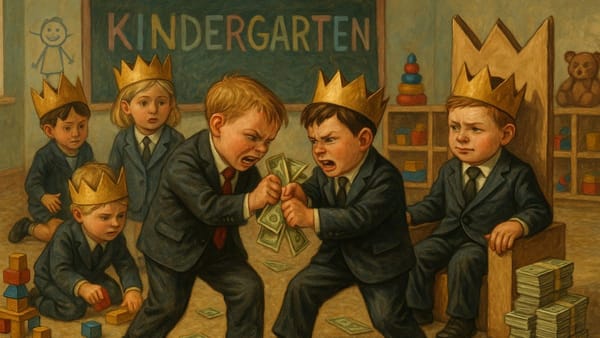I have recently returned to social media activity, particularly X (Twitter), where I describe myself as a “spiritual entertainer.” For the most part, I post insights on life using philosophy and spirituality, or rather, my twists of Buddhism, Zen, Hinduism, Taoism, Stoicism, or other great cultures suited to modern times. I'm not even trying to reinvent the wheel. I'm just trying to popularize these wonderful cultures and their timeless wisdom.
Finding new authors and quotes or organizing my thoughts on paper comes naturally to me. And somehow, I've found an audience that seems to enjoy morning quotes from some inspiring authors or quite random but always positive or encouraging insights throughout the day.
Great, everyone's happy. Well, not entirely.
While I'm not even expecting to make everybody happy, it's shocking that positive and encouraging content can be naive or childish for many people I've encountered online and offline over the years. Some extremists even act aggressively, seeing positive content, but most consider it simply irrelevant, knowing how ruthless our world is. Somehow, developing toughness or even cynicism is often considered a sign of maturity, even working intelligence.
When positivity feels like rebellion in a cynical age
It's remarkable how something as simple as promoting kindness, optimism, or goodwill can feel like a battle in today’s world, which often feels more like a landscape of harsh realities, cynicism, and mistrust. It’s almost laughable that choosing positivity can feel naive or even childish, just as if extending kindness or expressing genuine optimism could somehow diminish one’s seriousness or intelligence. But perhaps this view says more about the world we’ve constructed than about positivity itself.
In a way, we’re collectively gaslighting ourselves into believing that promoting positivity is somehow shallow or trivial. It’s as though a cynical society has taken hold and deemed these things too soft, too unrealistic, and frankly, too weak to be relevant. Our collective lens seems trained on power, intelligence, and, of course, a kind of hardened “realism” that’s supposed to shield us from disappointment.
This cynicism tells us that positivity is a luxury we can’t afford or, worse, that it’s just foolish. But in a world that feels hell-bent on reminding us of its darkness, choosing to promote positivity is anything but foolish. It’s quietly radical.
The quiet radicalism of kindness in modern life
This is particularly visible in the strange, ever-evolving landscape of social media full of fake value in search of profit and power or hatred fueled mainly by politics and the media. Positivity often becomes a target, dismissed as empty “good vibes” or naive optimism. There’s a part of society that’s always ready to dismiss those who encourage kindness and understanding as out of touch or simplistic. But perhaps it’s that very simplicity that we need. If we can’t find meaning in the fundamental acts of caring and empathy, then what exactly are we left with?
This is where it gets interesting because positivity is not blind to reality. In fact, it’s a conscious choice made despite reality, one that refuses to be dragged down by the darker shades of human nature. If we pause to think about it, this whole idea of cynicism being “serious” or “important” is itself just another construct. These labels are entirely man-made, and for whatever reason, we’ve decided to place cynicism above optimism or to view kindness as a weakness.
Perhaps this is why so many people hesitate to embrace positivity — they’re afraid of looking foolish. They fear seeming naive in a society that prizes ambition and self-interest, even though they know deep down that kindness and empathy are the foundations of what makes human life meaningful. But what we miss here is that positivity is not a naive hope that everything will be fine. No, it’s a belief in human potential, a vision of the world as it could be rather than as it currently is. And, unlike the fleeting satisfaction of accumulating money or status, positivity enriches not just those who embrace it but everyone around them.
Seeing beyond the illusion of toughness
In this way, choosing positivity is like stepping out of Plato’s Cave I like to recall, where shadows on the wall can represent the bleakness and cynicism society tells us to accept. The world in the cave would have us believe that the shadows — competitiveness, success, ego — are all there is, that kindness is a mirage, a mere illusion that doesn’t belong in “serious” life. But, as Plato’s allegory shows, those who stay fixated on the shadows are missing out on a greater reality. They get so wrapped up in chasing temporary success and validation that they can’t see how shallow their pursuits are. They think they’re winning, but in reality, they’re only deluding themselves, clinging to hollow symbols rather than real human connections.
The idea that positivity is foolish is as much an illusion as the game of shadows. We think we’re being practical by embracing cynicism, but what’s practical about a worldview that disconnects us from each other and fuels competition at the cost of compassion? To stay positive in a cynical world is not only a way to refuse the illusion but a way to offer an alternative, one that celebrates what’s real — kindness, empathy, connection.
Choosing light in a world that worships shadow
This is why we can’t let the world gaslight us into seeing positivity as trivial. Yes, people will scoff and say that focusing on kindness or optimism doesn’t make sense in “the real world,” where success is measured in money or influence. But let’s be honest — how meaningful is that success if it’s built on the backs of others and if it requires you to harden yourself to life’s beauty and depth? How much do we truly gain if we’re constantly playing a game of who has more or who looks stronger while ignoring our basic humanity?
Therefore, maybe choosing positivity isn’t about rejecting reality. Maybe it’s about committing to a reality that’s worth living in. The world has enough people willing to remind us of its harshness, enough voices shouting for cynicism. It doesn’t need more of that. It needs people who believe in kindness as a strength and who see compassion not as a luxury but as an essential part of who we are. It needs people who understand that no matter how dark things seem, there’s always light worth holding onto.
Choosing positivity in a harsh world may feel foolish, but maybe that's the point. It’s a quiet rebellion against the cynicism that tells us to be self-centered or skeptical. Kindness, optimism, and joy invite us to see past the shadows on the wall and experience a world that isn’t entirely defined by hardship. In fact, if there’s one thing history and experience show us, it’s that positivity doesn’t make us weaker or more vulnerable. It makes us resilient. It’s a source of strength that carries people through the darkest times — reassuring them that, despite appearances, there’s something in human nature worth celebrating.
Ultimately, if the world sees positivity as foolish, let it. If kindness and optimism make us feel a little vulnerable, then maybe vulnerability is exactly what this world needs more of. In a society that prizes competition and ambition, it’s worth staying on the side of kindness and connection. Because in the end, when all is said and done, it’s not the games we play that define us but the choices we make to hold onto what’s real.
And in a world that’s often ready to tear itself apart, what could be more real — or more radical — than choosing to lift each other up?
💙 Thanks for reading. If you enjoy my work and want more like this, consider supporting it. This space is 100% reader-funded — essays and research take time. You can subscribe, contribute, or explore reading lists I curate. Every bit of support helps.







